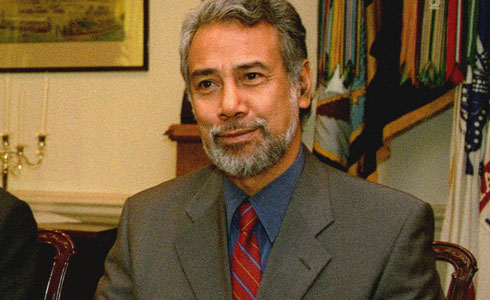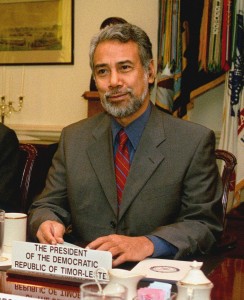“Forgive each other, forget the past, let us build the nation from ashes once again.”
For 40 years, Xanana Gusmão has worked for the freedom and development of his native country of Timor-Leste. During these 40 years, Xanana Gusmão has held many roles including: resistance leader, poet, political prisoner, negotiator, diplomat, and politician. Despite the numerous and important roles he has held, one of his most famous and important roles has been as a leader of forgiveness and reconciliation in Timor-Leste.
After spending more than 17 years as a guerrilla resistance fighter in the jungles of Timor-Leste, Gusmão was arrested on November 20, 1992. He would spend the next seven years serving as a political prisoner, primarily in Cipinang prison in Indonesia. As can be expected, prison was tough for Gusmão. “From morning to night I have to put up with insults and provocation, both personal and political. My every move is monitored and noted.” [1] Despite the hardships he faced in prison, several positive changes took place due to his imprisonment. First, Gusmão gained more international attention. The world had little access to him during his 17 years fighting in the jungles of East Timor and very little was known about him. Only a few interviews were conducted with him during his guerrilla years. As a political prisoner, he not only gained more and more followers and attention, but also met with many international leaders including Jimmy Carter, Nelson Mandela, Madeline Albright, and UN representatives, among others.
Gusmão’s prison experience also gave him time to further cultivate his political philosophies and ideas. He especially gained inspiration from the stories of other ex-political prisoners. “The example of the great man Nelson Mandela was an inspiration to me,” Gusmão said. [2] He was able to meet his inspiration in 1997, when Mandela visited Gusmão. Gusmão said this about the meeting: “His words that will always stay with me were that there is the need for dialogue and the need for tolerance. That has helped me very, very much.” [3] Mandela not only met with Gusmão, but also supported the freedom of Timor-Leste and worked to secure his release. After Gusmão’s release, Mandela said, “I’m happy that he is now out and he is busy trying to rebuild his country.” [4]
Since his time in prison, Gusmão has constantly spoken about the need for forgiveness and reconciliation. In the documentary Where the Sun Rises: A Hero’s Journey, Gusmão says,
“Forgiveness, to me, means peace of mind. If we can forgive, we liberate ourselves from all bad sentiments… of revenge… of self-flagellation. If we forgive, we stop a part of our life. We say no – now I am entering a new phase of my life. If not, I live everyday the sense that I am the worst victim in the world, and we are everyday trying to understand why… and we don’t live in peace. We are always trying to be selfish – ‘Me… me… why not him, or them?’ When we don’t forgive, we don’t free ourself from thinking on ourselves. Forgiveness is the way to live in peace. Peace not with other people but firstly, with him- or herself.” [5]
Gusmão also said that “Forgiveness… is a kind of deep courage … the way to live in peace.” [6]
Gusmão has done far more than speak of forgiveness. He has also tried to show what forgiveness is through his actions. On a personal level, Gusmão was given many opportunities to forgive. When faced with the man who betrayed him and revealed his location to the Indonesian forces who arrested him, Gusmão embraced the man in a symbol of forgiveness. [7] Gusmão’s actions of forgiveness have been a part of his political leadership as well. One such example happened on his first visit to Indonesia as the newly elected president of Timor-Leste. Here Gusmão showed his dedication to the ideals of forgiveness and reconciliation as he went to an Indonesian cemetery to lay a wreath at the place dedicated to those who died struggling for Indonesia’s independence. He said of the gesture, “We want to pay tribute to the heroes of the Indonesian independence.”[8] Despite decades of struggling against the Indonesian regime, Gusmão had made peace with Indonesia. He was able to acknowledge the good he saw in Indonesia, despite decades of seeing the worst.
President Gusmão constantly appealed for reconciliation and asked his fellow countrymen to forgive their perpetrators. He said, “We must all be honest and acknowledge our mistakes and be humble to forgive others. We must start with dialogue because we know that reconciliation is a process to search for peace within each one of us before we speak to all the community and for us to respect each other.” [9] Gusmão believes that forgiveness is a necessary ingredient to peace. “If you really want peace, if you really want stability, you have to put everything behind you…If not you will live under a trauma, the ghosts of the past. You can’t see the future.”[10] He especially believed that forgiveness would lead to progression and peace for Timor-Leste. “…one of the key aspects that enabled our Country to move away from conflict, hopefully forever, was the fact that our leaders and our People accepted in a consensual manner that there was a deep need in our society to practice Forgiveness and Reconciliation. In view of the complexity of our history, there is no better way to progress as a Nation than to cultivate forgiveness and social harmony within our society.”[11]
But Gusmão asked his people to do more than forgive the Indonesians they fought against during their struggle for independence. He would also ask them to forgive each other. During its first few years as an independent nation, Timor-Leste suffered several rounds of protests and violence as various political parties fought with one another. After one such incident, President Gusmão said,
“Forgive each other, forget the past, let us build the nation from ashes once again.” [12]
Timor-Leste is still struggling as a new nation, but it is slowly finding peace. President Gusmão said, “But I must say that without the commitment of East Timorese people, without patience, without their willingness to forget war, to not take revenge, without their commitment to peace [this wouldn’t have happened].”[13] During the Indonesian occupation both Gusmão and Timor-Leste lost greatly. Gusmão lost many loved ones, seven years of freedom and decades of his life in his struggle against the Indonesian occupation. Many would argue that Gusmão has a right to seek justice over forgiveness, but Gusmão has instead sought the path of forgiveness, not only for himself but for his whole nation.
——————-
[1] Niner, Sara. 2004. “Our Brother, Maun Bo’t: The Biography of Xanana Gusmão, Leader of the East Timorese Struggle.” PhD Thesis, Monash University. Available at: https://monash.academia.edu/SaraNiner/2004-PhD-Thesis:-Xanana.
[2] Associated Press. 2000. “Jailed 7 Years, E. Timor’s Gusmao Meets With ‘Inspiration’ Mandela.” Los Angeles Times, March 30. Available at: http://articles.latimes.com/2000/mar/30/news/mn-14328.
[3] “Interview with Xanana Gusmao: Don’t call me Asia’s Nelson Mandela.” 2003. Available at: http://www.etan.org/et2003/september/21-30/21intrvw.htm.
[4] Associated Press. 2000. “Jailed 7 Years, E. Timor’s Gusmao Meets With ‘Inspiration’ Mandela.” Los Angeles Times, March 30. Available at: http://articles.latimes.com/2000/mar/30/news/mn-14328.
[5] “A Hero’s Journey: a documentary film.” 2006. Available at: http://www.luxlucis.sg/A%20HERO%27S%20JOURNEY%20full%20synopsis+director%27s%20bio.pdf.
[6] “Journey of forgiveness in Xanana doc.” 2006. Jakarta Post, December 16. Available at: http://m.thejakartapost.com/news/2006/12/16/journey-forgiveness-xanana-doc.html.
[7] “Journey of forgiveness in Xanana doc.” 2006. Jakarta Post, December 16. Available at: http://m.thejakartapost.com/news/2006/12/16/journey-forgiveness-xanana-doc.html.
[8] “Gusmao commemorates Indonesian dead.” 2002. BBC News, July 3. Available at: http://news.bbc.co.uk/2/hi/asia-pacific/2087721.stm.
[9] “East Timor News Digest 11 – November 1-30, 2006.” 2006. Available at: http://www.asia-pacific-solidarity.net/southeastasia/easttimor/netnews/2006/end_11v5.htm.
[10] McBeth, John. 2005. “Timor Leste’s past: Let it be or bare it all?” Straits Times, December 22. Available at: http://www.asiamedia.ucla.edu/article.asp?parentid=36107.
[11] Gusmão, Kay Rala Xanana. 2011. “Goodbye Conflict, Welcome Development – The Timor-Leste Experience.” Address given at Johns Hopkins University, Washington DC, 24 February 2011: 14. Available at: http://asiasociety.org/files/pdf/110225_gusmao_asdc.pdf.
[12] “E Timor president plea for unity.” 2006. BBC News, June 1. Available at: http://news.bbc.co.uk/2/hi/asia-pacific/5036070.stm
[13] Taylor, Rachel S. 2002. “Interview: East Timorese President Xanana Gusmao.” World Press Review, October 1. Available at: http://www.worldpress.org/Asia/743.cfm.



President Gusmão’s life story is a remarkable inspiration. Because he is a man that lived on both sides of an armed conflict, and came to realize that the side of love, forgiveness and tolerance is more fruitful and effective makes his story all the more touching and believable. His campaign to instill forgiveness within the people of his nation is no simple task. It requires patience, courage and dedication. His perseverance therefore is a reflection of his strong value system.